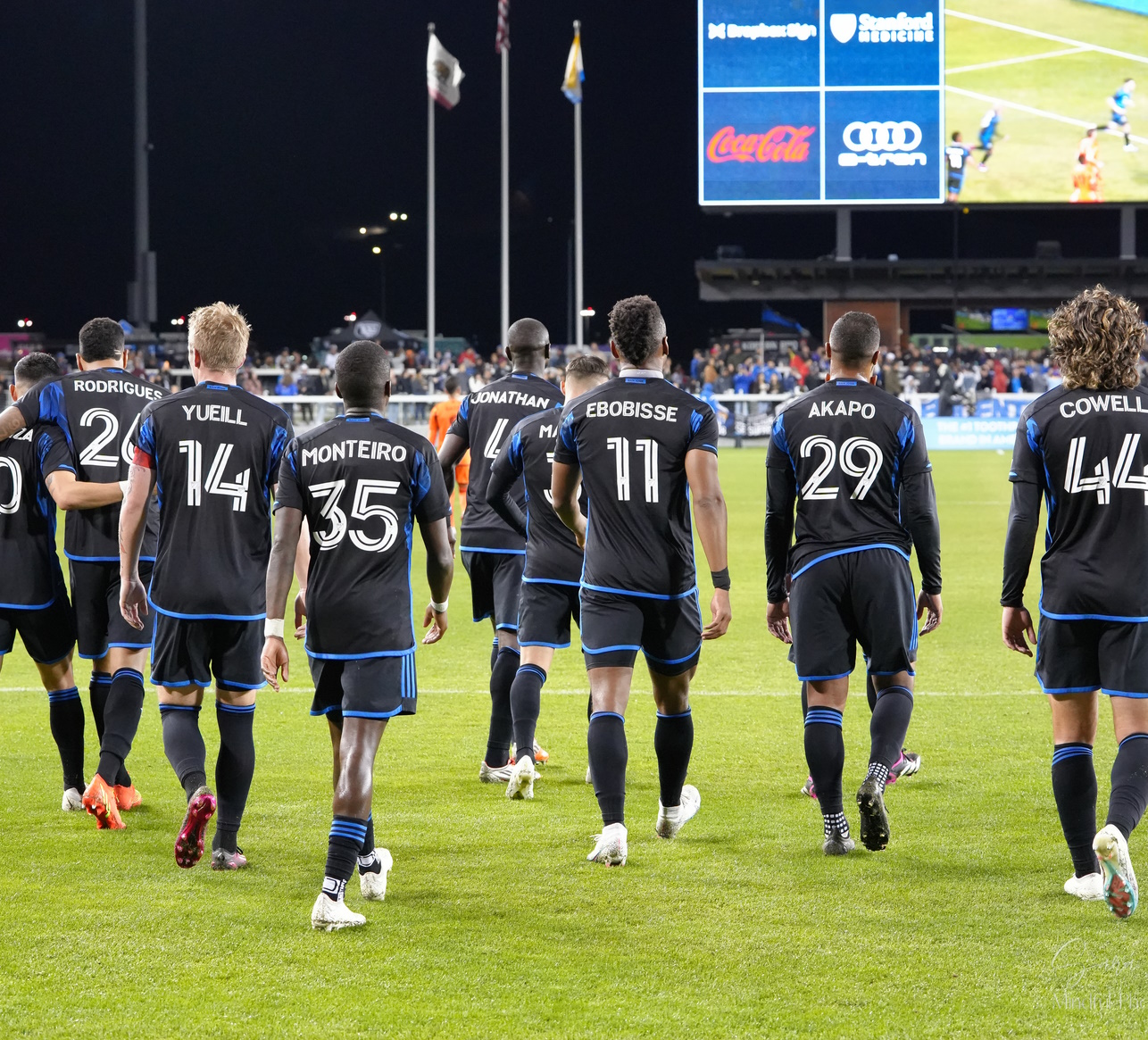San Jose Earthquakes players walk back to midfield after a goal against the Houston Dynamo at PayPal Park on April 1, 2023. Photo credit: Sara Nicole Mindful Photography for Quakes Epicenter. Instagram: @saranicole_mindfulphotography.
This article can be summarized with one comment from Luchi Gonzalez’s midweek press conference on April 12.
I’m not a “rah-rah for team” guy. I traded in my fan card when I joined the media side. As an analyst, I feel a responsibility to be factual instead of hopeful while giving players the benefit of the doubt over a longer term rather than get hung up on single-game performances.
A Past to be Ashamed Of
I soured pretty quickly on the Matias Almeyda hire in his first year. The tactics on the defensive side stunk, the players were wrong for them, and there was this whole Bushido Code thing that didn’t sit right with me. In 2019, there was a honeymoon period albeit with several losses, then things clicked for a bit, then the tactics got figured out, and then things turned sharply south after that.
When things turned south, they went from Bushido to Bullshido very quickly. First Almeyda was ejected for something he said to a referee at LAFC which led to him pointing in the face of and touching the fourth official, and then pointing and screaming at security and fans on his way into the tunnel, even asking a fan to meet him by the tunnel, so he could…what? Fight him?
Miraculously for Matias, he was suspended only for a game for that ejection and incident. It wasn’t nearly enough, and it taught him nothing.
Then there was the constant abuse of referees and blaming them after every loss down the 2019 stretch run. Almeyda finally put the nail in the Quakes’ playoff hopes by getting ejected in Atlanta for “foul and abusive language” at officials during a particularly intense match. The next couple of games were followed by more finger-pointing at referees. A lot of fans initially had his back, but Almeyda’s antics helped cause the Quakes to miss the playoffs after being one of the Western Conference’s top teams in July.
Reports came from inside the club that the Bushido Code only applied to how Almeyda treated the players. Everyone else — including front-office employees, in addition to the league, referees, and media — had to deal with his prima donna attitude. He would often not attend league-mandated midweek press conferences, because he just…didn’t want to talk to us. GM Jesse Fioranelli spoke to the press after a particularly poor game in 2020, because Almeyda “had a headache.”
It never really got any better. Ejections by Almeyda and his staff littered his time in San Jose. Last season, before he was finally done with San Jose, Almeyda was accused by multiple people of either going after a fan after the home opener loss or at least baiting the fan to meet him in the tunnel after the game. The magic of his charisma and history of Chivas trophies no longer worked on the vast majority of the Quakes’ faithful.
“Abusive language” suspensions were strongly rumored to be homophobic in nature, if never actually stated by the league or by the referees. Regardless, abusive language is abusive language, period. If true, this behavior was just as reprehensible as Dante Vanzeir’s behavior. Vanzeir attempted an apology for his words and actions; Almeyda never did. How Almeyda’s actions were excused by some people because of his “coaching pedigree” has never stopped bothering me.
A New Way in San Jose
Things began to turn under Alex Covelo. Here was a coach that respected the players, the media, and everyone around him. It gave me hope, and I want to credit Covelo for that before jumping to last week’s New York Red Bulls game.
I was disgusted by Dante Vanzeir’s actions. Very clearly, so were the San Jose players. At the same time, I was proud to see how Quakes players handled the situation. I was proud of how Luchi Gonzalez handled the situation with Gerhard Struber (who should have been dismissed by the New York Red Bulls and the Red Bull Conglomerate this past week). I was particularly proud of Jeremy Ebobisse in the postgame press conference. I was proud of both Gonzalez press conferences over the last week.
I believe you were proud as well.
This video has been watched over 27,000 times, and last week’s Aftershock Postgame Show has been viewed over 4,000 times. I’m proud that we have a platform on which to discuss these issues that people feel they can trust and want to tune into.
What is becoming very evident in the Chris Leitch Era is that he’s put a priority on bringing in players with a high moral character that also are good MLS players. Ebobisse and Jonathan Mensah stand out in particular on and off the pitch.
High-work-rate players like Jamiro Monteiro and Cristian Espinoza are players you can tell your kids to watch. Jackson Yueill, JT Marcinkowski, Paul Marie, and others are players that fans can be proud are in their team. All these players are exemplary not just because of how they play, but for how they act. I’m optimistic that younger players like Cade Cowell, Benji Kikanovic, Niko Tsakiris, and Ousseni Bouda will learn from them and follow in their model. The players we don’t know as well yet like Rodrigues, Daniel, Miguel Trauco, Carlos Gruezo, and Carlos Akapo will hopefully show us the same things over time. Last week was a good start for some of them.
And Luchi Gonzalez is all class as he thanks the media for the way they covered the racism incident and prioritized covering the situation over the game.
A Change in Culture
New information came to light this week on how Gregg Berhalter’s comments to a group of executives, and a mixed-up set of communications around how public the talk could be, ignited the post-World Cup firestorm around the Berhalters and the Reynas that is still reverberating around the USMNT. But it was how much Berhalter invested in his leadership skills and the team culture that was debated religiously in our American Soccer Analysis Slack this past week. Some felt that meant he hadn’t invested enough on the soccer side. Some questioned the books that he was reading and the moral ethos of some of the executives he was talking to.
While criticism of how Berhalter went about educating himself on how to change the USMNT culture is fair on some levels, the fact that culture change was needed after the debacle of the 2018 World Cup Qualifying cycle under Jurgen Klinsmann (then asking Bruce Arena to clean up his mess) is not in question by anyone.
Ron Westrum is an American sociologist who researched organizational cultures and defined the typology that is used in business schools and corporate training today. It’s called the Westrum Organizational Culture model. In short, it looks like this:
- Pathological (power-oriented) organizations are characterized by large amounts of fear and threat. People often hoard information or withhold it for political reasons, or distort it to make themselves look better.
- Bureaucratic (rule-oriented) organizations protect departments. Those in the department want to maintain their “turf,” insist on their own rules, and generally do things by the book—their book.
- Generative (performance-oriented) organizations focus on the mission. How do we accomplish our goal? Everything is subordinated to good performance, to doing what we are supposed to do.
A more detailed breakout can be found here, and if you are a manager or leader in an organization I highly recommend reading more about it. Westrum’s model has been used by leaders the world over and in many ways spurred the occasionally-questionable corporate leadership “self-help” books and accompanying sub-culture.
That said, Westrum’s model is still a highly valuable way to view an organization and how its leadership works. Under Almeyda, the elements of the “Bushido Code” made you think the Quakes were moving to a Generative culture, but it was actually a Pathological culture. In a Pathological culture, responsibilities (like press conferences) are shirked, failure leads to scapegoating (like referees and the league), and charismatic leaders use their power to get their way and try to make you feel like you are wrong to question their methods. This goes beyond just company culture and into American and world culture.
The shift under Gonzalez is toward a Generative culture — the same type of culture that Berhalter attempted, and mostly succeeded, in implementing in the USMNT in the past four years. This is why his players loved him. The USMNT team is still benefiting from it under its current caretaker, Anthony Hudson. The Quakes are benefiting from it under Gonzalez as he has brought it to San Jose.
A Generative culture is one where everyone is invited to cooperate in the change, the risks are shared, failure leads to inquiry not blame, and the best ideas from the entire group, not just one person, win out. In this culture, leaders listen to the rank-and-file, and trust is given to those who know more to make the decisions, such as happened when Luchi listened to his players about what they heard on the pitch and trusted what they said as true. Greatness in others is assumed from the beginning.
W. Edwards Deming is the man who changed the entire automotive industry in the 1970s by creating the principles used by the Toyota Production System. One of Deming’s most famous quotes is, “Everyone is already doing their best; the problems are with the system…only management can change the system.” The Quakes problems were with the system. Luchi Gonzalez is now working with Chris Leitch and even Jared Shawlee to change the system.
“The way we act is important before the way we play.” Well said, Luchi. Winning is just a nice bonus when you do things the right way with the right priority.
Bay Area, you once again have a professional soccer team you can be proud of. It’s time to support them the way they deserve.
Afterword
Author’s notes: Given I have never experienced racism and never experienced homophobia, I don’t feel qualified to speak to these topics in the manner they deserve. Regarding racism, here’s a link to a podcast from our friends at Quakes After 90, with Black hosts like Dom Skipper and Sterling McGarvey, who can speak more authoritatively on the subject. Please give them your ear so we can all educate ourselves more.
Finally, I want to give a final thank you to my friend, Jake Pisani, who is leaving the Earthquakes after seven-and-a-half seasons as the Senior Director of Communications. It has been great working with you, Jake. Quakes Epicenter and The Aftershock would not be what they are without you. I look forward to seeing you the next time I’m in San Jose.




